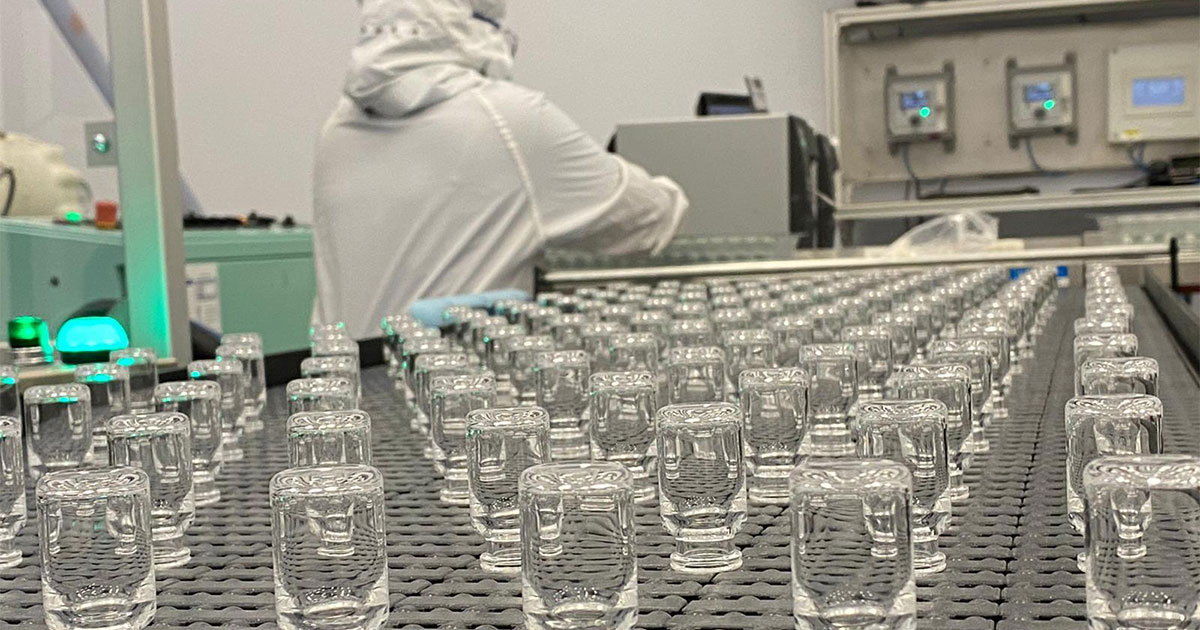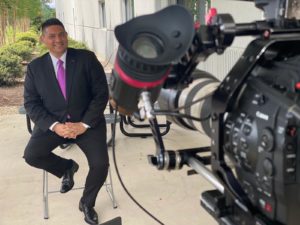Entrepreneurial Leaders Fuel the Race for a COVID-19 Vaccine

Lawrence Ganti ’97 knew his company needed to take action. SiO2 Materials Science, a manufacturer of medical products in Auburn, Alabama, was seeing all of its current business dry up in the face of the pandemic.
Fortunately, a chance at new business had presented itself. This opportunity would require a massive change in operations and the navigation of daunting uncertainty. But, it also held incredible promise, not only to boost SiO2’s bottom line, but also to make a far-reaching impact on many lives across the country.
The opportunity? The chance to manufacture millions upon millions of little vials for the desperately needed coronavirus vaccine. Pharmaceutical companies were rushing to create that vaccine, but they will needed something to hold those many, many doses, and that was the opportunity presenting itself to a manufacturer such as SiO2.
Vials weren’t something SiO2 normally produced, especially not in the numbers that were required. As an entrepreneurial leader, though, Ganti decided to give it a shot, setting in motion the complete transformation of his company.

“We had to really pivot,” says Ganti, who, as chief business officer and president of customer operations, handles the day-to-day operations of SiO2. “We needed to change, and change fast.”
In mere months, the company would add hundreds of employees, construct new factory space, and be awarded a $143 million government contract to be part of Operation Warp Speed, the national effort to manufacture and distribute a COVID-19 vaccine.
Ganti knows full well what is at stake with these efforts. Without hint of exaggeration, he says, “We’re trying to save the world, one vial at a time.”
The Quintessential Entrepreneur
The entrepreneurial mindset plays a critical role in the race for a coronavirus vaccine, from manufacturers such as SiO2 to even the researchers developing the vaccine itself. “Isn’t a researcher the quintessential entrepreneur?” asks Peter Wilson, senior lecturer in accounting at Babson. “Researchers are forced to act with limited information and to do so in a thoughtful and productive way for their organization.”
Much like entrepreneurs, researchers must confront failure. “It is a part of what science is,” says Babson’s Wiljeana Glover, the Steven C. and Carmella R. Kletjian Foundation Distinguished Professor in Global Healthcare Entrepreneurship. Researchers experiment, learn from their mistakes, and try again, all while sharing and collaborating with colleagues. “Experimentation is at the heart of entrepreneurship,” says Wilson, “and experimenting in a way that allows for learning and applying what is learned to refining the product or process.”
“Isn’t a researcher the quintessential entrepreneur? Researchers are forced to act with limited information and to do so in a thoughtful and productive way for their organization.”
Senior Lecturer Peter Wilson
Glover recently taught a Certificate in Advanced Management course, Experiment to Scale, at Pfizer. The timing couldn’t have been more perfect, as Pfizer and other companies hunt for a COVID-19 vaccine. “What Wiljeana has been able to do is take the principles of entrepreneurship that are part of our everyday teaching at Babson and show how they can be applied in a large pharmaceutical company to accelerate the creation of life-saving drugs,” says Wilson, the faculty director of the Pfizer CAM.
Glover marvels at the dedication of researchers working on a vaccine. “It feels like everyone at these organizations is taking an all-hands-on-deck attitude,” she says. “It is a remarkable feat. My hat is off to everyone.”
A Rush of Changes
As the pharmaceutical companies hurry to find a vaccine, Ganti and SiO2 have had to hurry to produce vials. By July 30, the company had made 40 million of them. The goal for the end of year is 120 million.
That’s remarkable given how little time the company had to pivot. In less than three months, SiO2 went from 120 to 460 employees, and it has built or is planning to build four additional manufacturing sites. Before the year began, it was expected to produce mostly syringes and blood collection tubes, but now its product mix is 90 percent different than what was anticipated.
That’s a rush of changes, and it comes at an important moment for the company, as SiO2 is only in its first year of commercial business, says Ganti. For some 10 years, the company was focused solely on research and development, earning more than 300 patents and spending millions of dollars perfecting its unique products, which are made with plastic but are lined inside with a very thin layer of glass. That material makeup gives it both the benefits of plastic (it won’t potentially break when it’s frozen) and the benefits of glass (it isn’t gas permeable), and that combination makes it an attractive option for vaccines.
Ganti, who previously was CEO of Latin America for Merck, was brought on to scale and run the business. “Most of what we talk about in entrepreneurship is the founder,” he says. “But, often times, entrepreneurship is also exemplified in the person that the founder brings in to help take the startup to scale.”
Ganti, of course, didn’t anticipate that scaling up would involve manufacturing vials in a pandemic. Like any good entrepreneur, he has had to embrace the uncertainty that has come in the last few months. When an employee would ask him a question he didn’t know the answer to, he would simply reply, “I don’t know. We’ll figure it out.” And, figuring it out is exactly what the company has done. “Uncertainty is a way of life, and we just deal with it,” says Ganti.
Posted in Entrepreneurial Leadership






